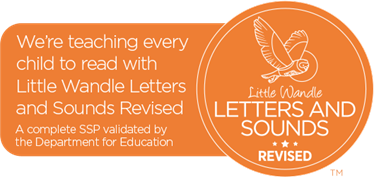Phonics

Supporting Phonics
There will be children who, for a number of reasons, may need support with reading. Through our daily teaching and termly assessments, we quickly identify children who are falling behind, or at risk of falling behind and provide them with individual or group keep-up sessions. Parents are always informed when a child is receiving reading intervention, and given guidance on how to support at home.
Children in Year 2 and above who did not pass the Year 1 Phonics Screening check, children who are new to our school, or children who are not reading at an age-appropriate level will take part in a Rapid Catch-up placement assessment to help us identify the support they need with reading. Pupil progress in reading is reviewed termly by our Phonics leaders.
Phonics at home
Little Wandle have a fantastic parents section with supporting videos and information to support parents with phonics at home.
https://www.littlewandlelettersandsounds.org.uk/resources/for-parents/
Online resources:
https://www.phonicsplay.co.uk/
Phonics play has a great range of free games for the children to play on a laptop or a tablet. These games help to support them with grapheme recognition and pseudo words.
https://www.topmarks.co.uk/english-games/5-7-years/letters-and-sounds
TopMarks is a similar website with a range of games to support your child's phonics at home.
Little Wandle
Little Wandle Revised Letters and Sounds
We believe that ALL children can learn to read and aim for ALL children to pass a phonics screening check and be reading at an age-appropriate level (or beyond) by the time they leave our school. This reading journey begins in the Early Years and continues through school, with children learning phonics as their primary means to read words. All teaching and support staff have been trained in teaching and delivering phonics sessions.
We begin teaching phonics in Nursery, following the Foundation in Phonics programme by Little Wandle Revised Letters and Sounds. Phonics sessions continue in Reception where children learn to read words by blending sounds together and become more fluent as they practice reading frequently throughout the week and are exposed to common words and letter combinations.
Our aim is for all children to be reading by the end of term 2 in Reception, just before we break up for Christmas. We acknowledge that reading is not an easy skill to master and it can be difficult as a parent to keep pace with the most up-to-date approach in helping your child to become a confident, fluent reader.
Children continue to have daily phonics sessions through Reception and into Year 1. In Year 1, we also help our children to prepare for their end of Year 1 Phonics Screening Check, which is designed to support parents and teachers with how a child is progressing with their reading.
A reading practice book* is sent home from the start of Reception and is matched to each child’s current reading level. The reading practice book can be read independently by your child, but we prefer for parents to listen to their child read and record this on their reading card. Reading every night will help your child become a fluent, confident reader, and time should also be found to share a read for pleasure book too! Your child can change their reading for pleasure book as often as they wish!
*Reading practice books are easily identified, as they have the ‘Little Wandle’ logo written on them and a gold 'Practice book' sticker. They also have guidance to support reading on the inside covers.
Phonics Cafe
Here at St. George's we have a commitment to supporting children and their parents with the learning of Phonics and Reading.
We now hold regular Phonics Cafe sessions. These are held in Woodlands hall and provide a range of interactive activities for children and parents to take part in. These activities are easily adaptable to have at home also.
Our next Phonics Cafe will be (TBC)
How do you say the sounds?
Tricky Words







